Непрерывное образование в течение жизни. Образование разных уровней. Рубрика в журнале - Вестник Южно-Уральского государственного университета. Серия: Образование. Педагогические науки
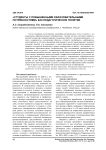
"Студенты с повышенными образовательными потребностями" как педагогическое понятие
Статья научная
Статья посвящена исследованию понятийно-категориального поля «студенты с повышенными образовательными потребностями». Авторы изучили состояние вопроса в научной литературе, проанализировали следующие понятия: «человеческий ресурс», «талант», «одаренность», «когнитивная гибкость», «студент», «потребность», «образовательная потребность». В статье обоснована необходимость четкого представления о сущности ключевых понятий и их взаимосвязь, а также представлен краткий обзор нормативно-правовых документов федерального уровня, направленных на работу с молодежью с повышенными образовательными потребностями. Для исследования понятийно-категориального поля «студенты с повышенными образовательными потребностями» были использованы различные методы, такие как метод анализа документов, метод теоретического анализа, сравнения, контекстуальный и морфологический анализ. В результате работы представлено уточненное понятие «студенты с повышенными образовательными потребностями». Данное исследование является первой ступенью к дальнейшим исследованиям, так как обзор по выделенным дефинициям служит руководством для освоения предметного поля исследования «студенты с повышенными образовательными потребностями» и ляжет в основу построения педагогической модели их образования.
Бесплатно
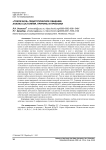
"Токсичное" педагогическое общение: анализ состояния, причины и признаки
Статья научная
Изменения в социально-педагогическом взаимодействии людей, особенно негативные, отражающиеся на педагогическом общении в вузе между преподавателем и студентом, должны подвергаться тщательному анализу и мониторингу, так как имеют непосредственное влияние на качество образования в высшей школе. Актуальность исследования продиктована обращающими на себя внимание единичными ситуациями «токсичного» общения в вузе. Цель статьи - анализ состояния педагогического общения на предмет его «токсичности». В качестве задач исследования авторами изучено понятие педагогического общения в вузе и некоторых его аспектов, связанных с проявлением «токсичности» в учебно-педагогическом взаимодействии; проанализировано понятие «токсичного» общения и его признаков; выявлены причины и предпосылки возникновения «токсичного» общения между педагогами и студентами: особенности цифрового поколения студентов, снижение коммуникативных навыков из-за влияния цифровизации и информатизации общества на становление личности обучающихся - представителя поколения Z, социальные и культурные различия преподавателей и студентов. Для исследования вопросов, связанных с проблемой «токсичного» педагогического общения и его проявления в учебно-педагогическом взаимодействии, авторами были использованы методы анализа психолого-педагогической литературы и профессиональной деятельности преподавателей, наблюдения и анонимного анкетирования преподавателей кафедры иностранных языков и студентов 1-го и 2-го курсов бакалавриата ЮУрГУ. По результатам исследования было установлено, что на сегодняшний день критических девиантных тенденций в рамках учебно-педагогического взаимодействия нет. Тем не менее для предупреждения возможных проявлений «токсичного» общения в будущем в силу ряда выявленных причин авторами на основе гуманно ориентированной системно-синергетической методологии Г.Н. Серикова предложена идея моделирования учебно-педагогического взаимодействия в рамках разработанной системы воспитательной работы кафедры иностранных языков ЮУрГУ, реализуемой преподавателями кафедры на занятиях по иностранному языку и во внеучебной деятельности через общекафедральные воспитательные мероприятия, утвержденные заведующим кафедрой. Совместная воспитательная (учебная и внеучебная) деятельность преподавателей и студентов, по мнению авторов, направленная на воспитание качеств личности и развитие коммуникативных навыков, является благоприятной средой, способствующей нивелированию трудностей и ошибок педагогического общения, повышая тем самым качество образовательного процесса в целом.
Бесплатно
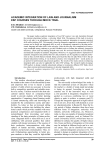
Academic integration of law and journalism ESP courses through mock trial
Статья научная
The paper studies academic integration of two ESP courses: Law and Journalism through the common educational setting - a role play Mock Trial. The purpose of this study is to prove that a role play is an advantageous form of making academic integration to master integrated skills while studying ESP. The research is based on integrative approach to incorporate two ESP courses and to single out integrated skills as well as competency approach to develop professional, language and other skills in the role play. After the role play was completed two surveys were conducted among students to get their feedback and to evaluate the academic integration efficiency. Likert scale and ranking method were used. We reviewed literature on ESP teaching and analyzed examples of academic integration. Moreover, we suggested authors’ implication of academic integration and justified that law and journalism can be regarded as adjacent professions as they are both human oriented. Being convinced that the role play Mock Trial is the apt integral educational setting, it was hosted to practice new integrated skill - social justice as an anchor for professional and personal qualities. The results of the study aimed at enhancing integrated skills can also be applicable for other ESP settings. The research might encourage ESP teachers to design valuable educational settings to incorporate different ESP fields which may share common professional purposes to develop integrated skills.
Бесплатно
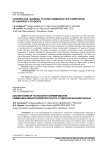
Cooperative learning to form communicative competence of university students
Статья научная
The article discusses the features of cooperative learning in universities, as well as its potential advantages related to edutainment, gamification, digital storytelling, and pitching. This innovative technology involves collaborative activities among students in small groups under the guidance of an instructor to achieve specific educational goals. Positive interactions among group members, individual responsibility of each participant, mutual encouragement of success in the student-student and student-instructor interaction, and the development of soft skills are the main components of cooperative learning. The research aims to develop and test a cooperative technology to form communicative competence of students of Russian higher education institutions. The authors developed a cooperative technology to form communicative competence of students, identified the characteristics of the technology, determined students' expectations from the technology used, and tested the technology through pedagogical experimentation. The study employed theoretical (integrative literature review, modeling) and empirical (survey, questionnaires, pedagogical experiment, descriptive statistics) methods. The experiment involved first-year bachelor's students from the advanced engineering school “Heart of Ural” at South Ural State University. The effectiveness of the developed technology was demonstrated based on the following criteria: the improvement of foreign language proficiency according to the European CEFR scale, motivation, and teamwork skills.
Бесплатно
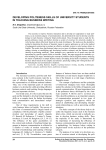
Developing politeness skills of university students in teaching business writing
Статья научная
The necessity to improve business interaction and to develop new approaches to study politeness, as an essential category of communication, has determined the need to develop a methodology to teach business writing for future professionals. Thus, the paper aims to study the linguistic politeness means and further develop a system of exercises for university students to write business letters effectively based on the study of politeness. The study uses the descriptive method to determine the choice of linguistic means to express politeness as well as the method of pedagogical construction to produce an effective methodic system to write business letters in English. The results show that business letters use two types of politeness strategies: the intimacy strategy (aiming at establishing and developing business contacts) and the distance strategy (aiming at preventing conflicts). These strategies use a particular set of speech acts that are represented by specific speech cliché or formulas. Finally, the paper suggests the methodic system including five stages: introducing the concept of politeness and its linguistic means; analyzing the means of politeness in sample business letters; developing lexical skills of politeness; writing business letters based on the samples and schemes; practicing reading and writing business letters imitating the real communicative situations.
Бесплатно
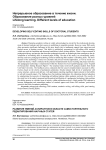
Developing self-editing skills of doctoral students
Статья научная
Mastering academic writing is widely acknowledged as crucial for the professional development of doctoral students and their success in publishing in reputable journals. However, many PhD candidates encounter significant challenges in this area, largely due to inadequate support from supervisors and limited access to training courses. This deficit is particularly pronounced in self-editing skills training, which can result in frustration and decreased confidence in their writing abilities. There is scarce research in pedagogical theory and practice that describes pedagogical models or technologies that contribute to the development of self-editing skills in research paper writing. The aim of this study is to scientifically justify, develop, and test a pedagogical technology aimed at enhancing PhD students’ self-editing skills. The development of the technology is based on systematic and process-oriented approaches, as well as social constructivism theory, which is reflected in the practical implementation of peer learning and project activities. The pedagogical technology is implemented within the framework of an English-language course “English for Researchers: Editing Research Papers”. The empirical study involved 29 graduate students from South Ural State University. The feedback survey conducted after the course's implementation assessed its effectiveness based on the criteria of participant satisfaction. Results indicate high levels of satisfaction with course structure, content, and delivery, with participants reporting significant improvements in their ability to self-edit research papers. The findings have far-reaching implications for enhancing doctoral education by emphasizing the necessity of integrating self-editing training within academic curricula. The novelty of the study lies in the author's proposal and theoretical justification of a pedagogical technology that positions the editing process as a distinct type of activity within publication activity, which enables PhD students to become independent and autonomous authors of research papers and fosters PhD students’ professional growth in the field of academic publishing.
Бесплатно
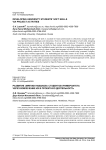
Developing university students’ soft skills via project activities
Статья научная
Developing soft skills is essential for future professionals to effectively navigate both personal and professional challenges and interactions. However, due to the abundance of soft skills, designing a unique development model can be challenging. A survey of 83 second-year IT students at South Ural State University revealed that key soft skills for them include teamwork, time-management, responsibility, and reflexivity. The survey also highlighted project activities as a particularly effective method for developing soft skills. This article aims to create a model that integrates soft skills development through project activities specifically tailored for ESL classes. The authors developed a model using systematic, complex, and personality-oriented approaches. The methodological basis and content of the model were defined. The model has two components (operational and determinant) and three units (motivational, modelling, and evaluation-corrective). The authors conclude that implementing a student-centered approach in ESL classes provides students with a tangible opportunity to enhance their soft skills.
Бесплатно
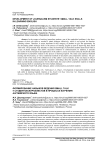
Development of journalism students’ small talk skills in learning English
Статья научная
In the context of training journalism students, one of the methodical problems is the development of their soft skills to conduct a phatic dialogue effectively, which is not typical for Russian-speaking culture. Therefore, it seems important for this category of students to give the opportunity for the developing phatic dialogue skills in the process of learning English as part of improving their Small Talk skills. The presented study attempts to study the knowledge of journalism students about Small Talk as a type of phatic dialogue that allows successful initiation of communication. In addition, it presents the results of the development and application of the author’s course assessment aimed at Small Talk skills development in journalism students in the process of learning English. The study used empirical methods (testing and observation), as well as traditional methods of descriptive and comparative statistics. The presented results of the study of the effectiveness of the author’s course indicate, on the one hand, its effectiveness in the improvement of journalism students’ knowledge about the specifics and benefits of Small Talk in professional communication. On the other hand, this course allows journalism students to improve their practical skills in conducting this form of phatic dialogue.
Бесплатно
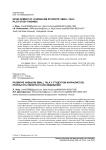
Development of journalism students’ small talk: pilot study findings
Статья научная
Effective communication is crucial for professionals in humanitarian and technical fields. One aspect of communication that is often overlooked is phatic dialogue, which is studied by linguists and cultural experts. However, there is limited research on the practical aspect of developing phatic dialogue skills, particularly in relation to studying English. This study aims to explore students' understanding of the importance of small talk in interpersonal communication, as well as assess students' proficiency in phatic dialogue in the context of journalism. The research involved surveys and tests conducted with students, and traditional statistical methods. The preliminary findings reveal varying levels of knowledge about the significance of small talk in social communication, as well as differences in the development of phatic dialogue skills among students. The results will inform the author's proposed methodology for evaluating the quality of small talk, which will be used as the basis for designing exercises to enhance phatic dialogue skills among journalism students.
Бесплатно
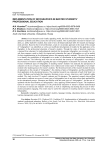
Implementation of infographics in master students' professional education
Статья научная
In an interactive and visually appealing world, the field of education strives to create visually attractive textbooks and online courses for university students. This is particularly relevant for master's students, as, unlike bachelor's students, they need to have developed analytical skills for research and management activities. Based on the reviewed literature, a lack of a systematic approach to the study of the concept of “infographics” was identified, as well as an insufficient development of models for the application of infographics in the professional education of master's students. Through the study of practical experience, a demand from educators for methodological materials that incorporate infographics was revealed. As a result, there emerges a need to clarify the concept and systematize the types of infographics, as well as models for their implementation in the educational process for preparing master's students. The aim of the research is to identify the possibilities of infographics as a means of visualization in the professional education of master's students. The following tasks were set and resolved: the concept of “infographics” was clarified; the awareness of master's students regarding the types of infographics in education was assessed; the effectiveness of different types of infographics in teaching master's students was analyzed; the perspectives of educators on the use of types of infographics were studied; and various types of infographics were implemented in the teaching process for master's students. The theoretical results of the research include the study of approaches to the concept of “infographics”, the ordering of types of infographics, and the possibilities of their application in the educational process. The empirical research was conducted at South Ural State University. Methods used included the integrative literature review, surveys, interviews, and Cronbach's alpha method. The study involved 33 master's students and 26 educators. The empirical research showed that most master's students are aware of some types of infographics but do not know about their applicability in the educational process. Educators are familiar with the main types of “infographics”, but are not acquainted with the classification of “infographics”, thus, applying limited amount of types. The implementation of various types of infographics in the professional education of master's students demonstrated an increase in interest and students’ motivation, as well as simplifying and making the process of information perception engaging. The results may be useful for educators in teaching master's students using infographics.
Бесплатно
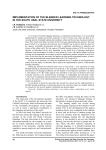
Implementation of the blended learning technology in the South Ural State University
Статья научная
Level system of foreign language learning is a widespread world practice. It is successfully implemented by leading universities around the world. In recent years, there has been an increasing interest in blended learning that combines online and face-to-face classroom practices. Since 2016, South Ural State University (SUSU) has been implementing this practice. The main goal of which is to transform the university into a SMART one in order to form the basis for the region’s sustainable development and make a significant contribution to education and science of the whole world. The key aspects of blended learning system in SUSU are: the development of individual activity style depending on the initial level of language proficiency; placement tests development in order to form groups by levels with online support for them; working out the appropriate score-rating system for monitoring students' progress at each level. Also, for the first time the university has applied the final results assessment practice in accordance with the international exams format such as KET, PET and IELTS. The aim of our research is to study the satisfaction level of students of non-linguistic specialties from the quality of education and to analyze the implementation process of the blended learning technology. During the research the following tasks were set and solved: 1. The experience of using blended learning in educational process was analyzed; 2. The comparative analysis of the initial and final level of language proficiency for the students of non-linguistic specialties was made; 3. The features of A1-B2 online support were described; 4. The types of classroom and extracurricular activities were considered (the percentage of independent and classroom work); 5. The level of satisfaction among students of non-linguistic specialties from the quality of education in the context of the educational program and the implementation of the blended learning system was analyzed. In conclusion it should be noted that this research has shown that the implementation of blended learning technology in educational process has a positive impact on students' learning. As a result of it, the level of students` satisfaction has become higher.
Бесплатно
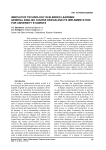
Статья научная
Data exchange in the 21st century becomes a crucial engine for all the processes, ideas, trends and breakthroughs in any professional sphere. This fact has two main implications: education as an institution needs revisiting; higher education must change in the most effective way to ensure professional success of the graduates. English as a professional and academic lingua franca should constitute an academic environment even in non-English speaking countries. The paper deals with the issues of blended learning and development of its online component. The objective of the research is to prove the positive influence of blended learning technology on educational outcomes in English as a foreign language (EFL) classes for university students of various CEFR (the Common European Framework of Reference) levels in the digital era. The methods used include the literature analysis and the experiment with twenty groups of students having traditional and blended learning classes. The results of the experiment were assessed via 1) IELTS-type test, 2) Moodle statistics, 3) students’ in-class participation, 4) instructors’ feedback, and 5) students’ feedback. The results show that blended learning has improved students’ reading skills, enlarged their vocabulary, enhanced their grammar ability compared with the traditional classes without online management system support, but the most critical issue is that blended learning has optimized classroom practice, reduced teacher’s preparation time, and stimulated students’ efforts.
Бесплатно
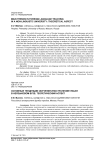
Main trends in foreign language teaching in a non-linguistic university: theoretical aspect
Статья научная
The article discusses the issues of foreign language education in a non-language university. In the light of globalization, political and social situations worldwide, this topic becomes particularly relevant. The aim of the article is to analyze and describe the current trends in foreign language education in a non-language university, as well as to analyze the implementation of the author's course based on individually designed projects as part of teaching foreign language to students of economic specialties. The author identified and characterized the main trends in foreign language education: individualization, integration of culture component in education programs, computerization, and professionalization; described the methods and means of implementing these trends in the educational process in a non-language university; developed a course for teaching English to students of economic specialties taking into account modern trends in foreign language education; conducted experimental work to pilot the course with a group of economist students from The Russian Presidential Academy of National Economy and Public Administration. The author emphasizes the importance of professionalization and the special role of the English language in preparing future specialists for professional communication and exchange of experience at an international level. For this reason, the training process for future professionals should be relevant to their future professional activities, and foreign language proficiency in the professional field can increase the competitiveness of future specialists.
Бесплатно
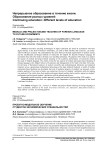
Module and project-based teaching of foreign language to future economists
Статья научная
Innovative teaching technologies in higher education are aimed at economists who have digital literacy in the field of business informatics, are able to think flexibly and creatively, can understand world-class research. The contradictions that arise between the high requirements of modern society and the insufficiently developed methods of instruction for English for Specific Purposes language for economists have led to the need to develop a new teaching technology. The purpose of the study is to analyze the impact of module and project-based teaching on the academic performance of economists during the study of English language. The article reveals the key aspects of module and project-based teaching of foreign language at the Higher School of Economics and Management of the South Ural State University. On the basis of theoretical (analysis of modern scientific and methodological literature) and empirical (Internet survey, questioning, mathematical processing of the data obtained) methods, a model of module and project-based teaching was developed, the level of academic progress of students was assessed, a comparative analysis of two terms of study was carried out, the level of students’ satisfaction with the training was analyzed. The results show that module and project-based teaching had a positive impact on students’ performance and increased students’ satisfaction with the educational process.
Бесплатно
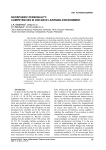
Noospheric personality: competencies in distance learning environment
Статья научная
Since human civilization, including the educational system, is currently experiencing a deep crisis, the issues of noogenesis are becoming especially relevant. It means that the development of society is primarily the spiritual development of each individual, who is ready for productive interaction in order to save the planet from human destruction. Nevertheless, the situation of COVID19 pandemic showed how the modern world is losing its face-to-face communication becoming more computer-mediated, data-overwhelmed and online-dependent. Consequently, the task of forming the noospheric personality becomes crucial in new conditions, and this task can be solved by pedagogy. The current paper defines noospheric personality and addresses the issues of competence development in distance learning. The objective of the research is to develop the model of due competences in distance learning noosphere. The methods used include the analysis of the theories and concepts in the references provided and modeling the pedagogical process. The results are represented in two interconnected pedagogical models: the model of distance learning participants’ interaction system in the aspect of noospheric pedagogy and competence model of noospheric personality. The interaction model structurally summarises the process of distance learning communications while competence model outlines the content of noospheric personality’s development, pointing out the transition from competences to personal culture and highlighting the importance of civic consciousness as the main mover that brings real change. The research demonstrates a new efficient way of dealing with modern systemic educational crisis and can be used as a guide in making distance learning programs and courses.
Бесплатно
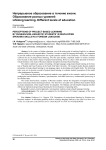
Статья научная
In the context of higher education, one of the main goals of teaching English is to enhance students' ability in oral communication. Therefore, in order to study the language thoroughly, it is important to provide students with opportunities for regular practice outside of the classroom. An effective solution could be the use of project-based learning. Over the past decades, empirical studies in various countries have focused on the positive impact of project-based learning. However, there is little attention in the theoretical literature to the study of Russian students' perception of project-based learning.The article explores key aspects of teaching a foreign language using project-based learning at the Institute of Natural and Exact Sciences at the South Ural State University. The research studies Russian students' perception of project-based learning in non-language majors in developing oral English skills. The following tasks were set: to develop a model of project-based learning, to evaluate students' perception of this model when implemented in practice.The following theoretical and empirical methods were applied in the research: analysis of modern pedagogical and methodical literature, questionnaires, individual interviews, mathematical processing of the obtained data.The results showed that a majority of Russian students viewed the integration of English language classes and project-based learning positively. The interviews revealed some problems that students faced in project preparation, which require further investigation. The findings can help English language teachers effectively implement project-based learning for the development of speaking skills.
Бесплатно
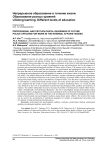
Статья научная
Currently, the entire world community is facing fundamental changes and reforms in many government structures and spheres of public life. In modern society, there is an increase in socially dangerous trends, which necessitates the need to improve education in the field of initial professional training of internal affairs officers and to search for pedagogical means and technologies for the development of personal and professional-pedagogical qualities of future police officers. The purpose of the study is to theoretically substantiate the need for the formation of psychological and pedagogical skills and qualities that form the basis of professional and psychological readiness and to identify the level of development of psychological and pedagogical skills and qualities of students of the higher school of the Ministry of Internal Affairs. The authors analyzed the scientific literature, normative documents regulating the organization of activities of educational institutions in the system of the Ministry of Internal Affairs; and the curricula for initial professional training courses at the Ministry of Internal Affairs. The data from a questionnaire survey of 350 students in initial professional training courses for senior, private and junior commanding officers were compared with the results of expert assessments of teachers conducting classes. As a result, the data were obtained on the level of development of professional psychological skills, qualities and resilience of students. The authors substantiate the need to increase the number of training hours studied within the discipline “Fundamentals of Psychological Readiness”, but also to meaningfully change the discipline content to develop students’ pedagogical, technical and psychological skills, professional thinking and professional psychological readiness. This work contributes to the development of the theoretical foundations for the formation of professional and psychological readiness among future police officers. The results of the study can be used in the development of educational programs for students at departmental universities and for students of initial professional training courses.
Бесплатно
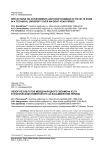
Статья научная
IELTS exam is an internationally recognized tool to measure students’ proficiency in academic English, and in anglophone countries it often plays a role of a gatekeeper to a university. At National University of Science and Technology MISiS (NUST MISiS) IELTS exam, on the contrary, completes a four-year long English course for all majors. IELTS exam was used as the unique KPI of the program effectiveness, enabling the department to monitor graduates’ proficiency throughout eight years, track its dynamics against the placement test levels, and oversee the factors which affect final results. The data obtained from 5600 engineering students revealed that no more than 50% could achieve the target B2/C1. There was a strong correlation between the entrance levels and final IELTS results, except for the COVID-19 year (KPI = 38%). Trajectories drawn for each starting level statistically confirm the primacy of this factor. The entrants with the initial A1 level could hardly achieve B2 (11%), while A2 cohort were in the zone of perspective growth (57%). Among other factors that impede setting higher KPI the authors name the nature of the university environment with the high flexibility of a student population, and their motivation to take IELTS. These findings demonstrate that actual effectiveness of a program can differ significantly from theoretical expectations, and this should be taken into account by course designers.
Бесплатно
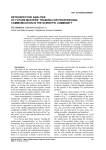
Статья научная
The problem of getting future masters ready for professional communication in the scientific community is considered on the basis of a retrospective analysis. This problem is influenced by the processes of internationalization in education and integration of scientific, educational and production areas. The historical retrospective is made on the basis of the following criteria: 1) the formation of masters' education, 2) the development of scientific communication, 3) the development of foreign language education, 4) the formation of language for professional purposes. Representing the historiography of the problem the author reveals three main periods: from 45th to 60s of the 20th century; from 70th to 90s of the 20th century; from the beginning of the 2000s to the present. The period before 1945 is considered a preparatory one. It created social, scientific and practical conditions for training future masters for professional communication in the scientific community.
Бесплатно
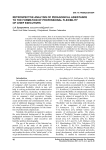
Статья научная
In a modernized economy, there is an increased need for quality training of company's chief executives with a high level of professional flexibility. The aim of this study is to identify socio-historical and theoretical-pedagogical preconditions for the formation and development of this quality in chief executives. This study analyses baseline data for further structuring and improving educational practices for professional flexibility formation. The understanding of the pedagogical assistance issue of professional flexibility formation of company's chief executives is based on a retrospective analysis. The historical retrospective is established on the following research subjects: “supplementary adult education”; “professional flexibility”; “pedagogical facilitation”; “targeting company's chief executives”. Representing the historiography of the problem the author reveals three historical periods: the 1st one is from the beginning of the 60s to the end of the 80s of the XX century; the 2nd period is from the end of the 80s of the XX century to the beginning of the 2000s; the 3rd period is from the beginning of the 2000 up to the present. The period before the 1960s is regarded as a preparatory one. It created social, scientific, and practical conditions for pedagogical assistance to the development of professional flexibility among company's chief executives.
Бесплатно

